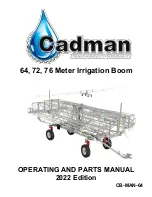
M-Nav 650 || User Manual
5
1.
In
tro
d
uc
tio
n
1
Introduction
Thank you for purchasing this Navman M-Nav 650. We hope you enjoy your new GPS messaging and
navigation system.
Whether your fleet operates in your own city, across a country or a continent, the M-Nav will direct your
fleet operators to their destination without the need for map books or second hand directions. With
destinations provided from the OnlineAVL client by the Fleet Manager you can rest assured that your
fleet operators are taking the fastest route to the correct destination all the time, every time.
The Global Positioning System (GPS) is available free of charge, at any time, and is usually accurate to
within 5 m (15 ft). Your M-Nav map provides street-level detail for door-to-door navigation, including
Points of Interest (POIs) such as accommodation, petrol stations, railway stations and airports.
Navman welcomes your feedback. To contact us or visit our website, see Support Information in the
Contacts section.
1.1
GPS and GPS Signals
The GPS is a network of satellites that transmit accurate time and position information worldwide. GPS
receivers receive signals from these satellites and use the information to determine an exact location.
Satellites orbit the earth at around 12,000 miles. While a GPS receiver can detect signals from up to
12 satellites at any time, only three signals are needed to provide a position or “GPS fix” (latitude and
longitude) for vehicle navigation systems.
The GPS receiver, such as the Navman Halo or Qube, receives GPS signals. To receive GPS signals,
ensure that the the receiver is outdoors, or in a vehicle outdoors, and the GPS antenna has an
unobstructed view of the sky.
For more information about GPS and your M-Nav, see Section 5.
1.2
Safety Notice
WARNING: In a vehicle, it is your sole responsibility to place, secure and use the M-Nav in a manner
that will not cause accidents, personal injury or property damage. The user of this product is solely
responsible for observing safe driving practices and for all use of this device. It is your responsibility to
read and follow the vehicle mount installation instructions and to use the product consistent with your
government’s laws/regulations. Consult the vehicle manual to ensure the mounting location is safe.
It is your sole responsibility to adhere to the following safety instructions at all times:
• Do not operate the M-Nav while driving or place the M-Nav
in a position that obstructs the driver’s view.
• Do not mount the M-Nav in a way that may be distracting or interfere with the safe
operation of the vehicle, the deployment of airbags or other safety equipment.
• Do not leave the M-Nav in view while your vehicle is unattended,
especially in strong or direct sunlight.
• Do not use or handle the M-Nav when it is hot; leave it to cool, out of direct sunlight.
This device does not have the functionality to determine routes based on the height, weight, length
or Hazmat classification of the vehicle in which the device is installed. Accordingly it is your sole
responsibility for ensuring that your vehicle is legally and physically able to travel over routes that may
include narrow, twisting or steep roads, weak, narrow or low bridges, tunnels or other obstacles on the
routes determined by this device.
Failure to adhere to these instructions may lead to serious personal injury, including death, or property
damage. Navman disclaims all liability for use of the M-Nav that contributes to injuries, death, property
damage or violates law.
Summary of Contents for M-Nav 650
Page 1: ...M Nav 650 User Manual English Europe Australia New Zealand...
Page 2: ...2 NAVMAN...
Page 6: ...6 NAVMAN...
Page 80: ...80 NAVMAN Notes...
Page 81: ...M Nav 650 User Manual 81 Notes...
Page 82: ...82 NAVMAN...
Page 83: ......
Page 84: ...MN000285A...






































